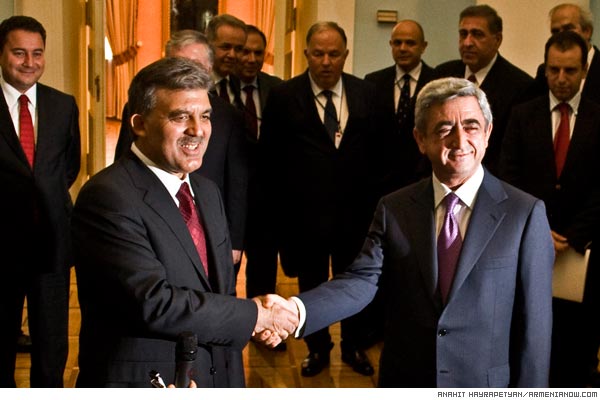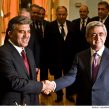
Yerevan Thwarts the US-Backed Armenia-Turkey Rapprochement
Publication: Eurasia Daily Monitor Volume: 8 Issue: 148
By:

Barely a week after US Secretary of State, Hillary Clinton, had asked Turkey’s leaders in Ankara to open the Turkish-Armenian border, Armenian President Serzh Sarksyan has thwarted that effort by issuing an irredentist-sounding statement to youth (“Armenian President Casts Doubt On Ongoing Negotiating Processes,” EDM, August 2).
The Obama administration wants Turkey to re-open its border with Armenia for transportation and trade, without delay and unconditionally, as part of an effort to normalize Turkish-Armenian relations. Washington has its own understanding of normalization in this case. It wants Turkey to break the conditional linkage between opening of that border and withdrawal of Armenian troops from certain districts of Azerbaijan. This conditionality, however, is Baku’s main peaceful trump-card in the conflict-resolution negotiations. It also forms a long-standing joint position of Azerbaijan and Turkey.
Washington had strongly urged Ankara to break that linkage in 2009 through the Zurich protocols, signed by Turkish President Abdullah Gul with Sarksyan. Under these documents, Turkey was to open the border without conditioning this on Armenian troop withdrawal from certain Azerbaijani districts. Since December 2009, however, Ankara has reinstated that conditionality, refusing to sacrifice Baku’s interests. Many observers attributed this stance to pre-election constraints in Turkey, and expected Erdogan to give way on this issue after winning the June 2011 elections.
Clinton’s advisers had apparently shared that general expectation. They seized Turkey’s post-election moment, but also decided to proceed incrementally with the border-opening proposal this time. On July 14-15, conferring with Turkey’s top leaders in Ankara, Clinton decided to spend precious US political capital by adding this issue to the agenda. She urged Turkey to open some border-crossing points with Armenia, again ignoring Azerbaijan’s interests. This limited opening would supposedly not necessitate parliamentary ratification, unlike the full-scale opening envisaged in the October 2009 Zurich protocols. Those documents require ratification, and having never received it, were withdrawn from consideration in the Armenian parliament, and stand little chance in Turkey’s parliament even after the elections just held. Turkey’s leaders (including President Gul, signatory to those protocols) politely demurred in response to Clinton’s proposal, but did not conclusively rule it out (Zaman, Hurriyet, July 15-16).
Against this backdrop, Yerevan has undercut Clinton’s latest effort in Ankara, and any follow-up from Washington on this issue. The Turkish government would find it even more difficult politically to consider opening the border (or certain crossing points) with Armenia, in the wake of Sarksyan’s declaration and the accompanying statements.
If Washington’s latest initiative presupposed (as in 2009) that Ankara would break ranks with Baku on the border-opening issue, Turkey has actually closed ranks more tightly with Baku, following Sarksyan’s statement to Armenian youth. While Erdogan was visiting Baku, a statement by Turkey’s foreign ministry remonstrated that state leaders ought to prepare their societies, particularly their youth, for a peaceful future, and “not to provoke enmity. Sarksyan has no intention to work for peace,” it concluded harshly (Anatolia news agency, July 27).
That statement may have reflected some frustration with the outcome of Turkish Foreign Minister, Ahmed Davutoglu’s, meeting with a group of Armenian non-governmental organizations’ (NGOs) leaders who were visiting Ankara. Back-to-back with Clinton’s visit, Davutoglu received that group spontaneously for an unscheduled, lengthy, and exceptionally friendly meeting, according to Turkish press reports. Back in Yerevan, however, the meeting’s readout for the media was frosty, replete with warnings about implacable pursuit of the Armenian genocide issue against Turkey, particularly in the US political arena (PanArmenianNet, Armenpress, July 24, 25).
Washington’s border-opening initiative is the centerpiece in complex negotiations among the Obama administration, Armenian advocacy groups in the US, the Armenian government and Turkey. The administration, unable to deliver on genocide-recognition promises, is offering instead to alleviate Armenia’s economic predicament by opening the Turkey-Armenia border. In return, the administration (and, to a far lesser extent, Ankara) would expect Yerevan and Armenian advocacy groups to ease the pressures for genocide-recognition, moving that issue from the center of the US political arena to a commission of historians.
Washington’s initiative, however, deprives Azerbaijan of its only available peaceful incentive in negotiating the withdrawal of Armenian troops from six districts (other than the Armenian-populated Karabakh). That incentive is the Turkish-Azerbaijani joint position that both countries would open the borders with Armenia, in return for the withdrawal of Armenian troops.
The US proposal, on offer since 2009, is stalled on all its tracks. It ground to a halt on the US-Turkey track in 2010 when Ankara (not without hesitation) declined to sideline Azerbaijan or deal at its expense. Ankara is aware that “Clinton has invested so much capital” in a Turkey-Armenia rapprochement (Hurriyet, July 31), but it has almost certainly deferred any consideration of this issue until further notice, following the latest statements from Yerevan.




